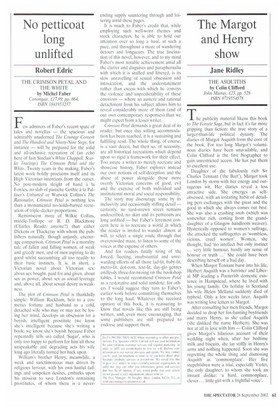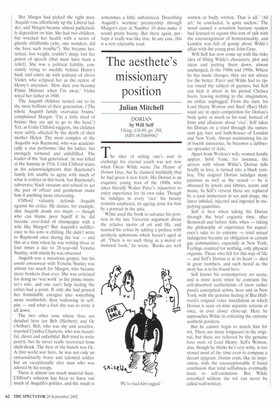The Margot and Henry show
Jane Ridley
THE ASQUITHS by Colin Clifford John Murray, 125, pp. 528 ISBN 0719554578 The publicity material likens this book to The Forsyte Saga, but in fact it's far more gripping than fiction: the true story of a larger-than-life political dynasty. The diaries of Margot Asquith form the core of the book. For too long Margot's voluminous diaries have been unavailable, and Colin Clifford is the first biographer to gain unrestricted access. He has put them to excellent use.
Daughter of the fabulously rich Sir Charles Tennant ('the Bart'), Margot took London by storm with her energy and outrageous wit. Her diaries reveal a less attractive side. She emerges as selfobsessed, with an irritating habit of detailing pert exchanges with the great and the good in which she always comes out best. She was also a crashing snob (which was somewhat rich, coming from the granddaughter of a Glasgow handloorn weaver). Hysterically opposed to women's suffrage, she attacked the suffragettes as `wombless, vicious, cruel women'. Women, she thought, had 'no intellect but only instinct ... very little humour, hardly any sense of honour or truth ... ' She could have been describing herself on a bad day.
When Margot Tennant burst into his life, Herbert Asquith was a barrister and Liberal MP leading a Pooterish domestic existence in Hampstead, where he lived with his young family. On holiday in Scotland his wife Helen Melland suddenly died of typhoid. Only a few weeks later, Asquith was writing love letters to Margot.
After consulting her men friends, Margot decided to drop her fox-hunting boyfriends and marry Henry, as she called Asquith (she disliked the name Herbert). She was not at all in love with him Cohn Clifford gives Margot's hilarious account of their wedding night when, after her bedtime milk and biscuits, she lay stiffly in Henry's arms and nothing happened. Soon she was regretting the whole thing and dismissing Asquith as 'commonplace'. Her five stepchildren were a trial, especially Violet, the only daughter, to whom she took an instant dislike: 'a hard, commonplace, clever ... little girl with a frightful voice'. But Margot had picked the right man. Asquith rose effortlessly up the Liberal ladder, and Margot became almost pathetically dependent on him. She had two children, but wrecked her health with a series of ghastly childbirths (why, one wonders, did she have such trouble?). She became hysterical, lost weight, couldn't sleep, lost her power of speech (that must have been a relief). She was a political liability, constantly trying to meddle behind Henry's back and eaten up with jealousy of clever Violet, who eclipsed her as the centre of Henry's attention. 'How dare you become Prime Minister when I'm away,' Violet wired her father in 1908.
The Asquith children turned out to be the most brilliant of their generation. (The whole Asquith family overvalue brains,' complained Margot. 'I'm a little tired of brains: they are apt to go to the head.) Yet, as Colin Clifford suggests, the children were subtly affected by the death of their mother Helen. The most complex of the Asquiths was Raymond, who was academically a star performer like his father, but strangely tortured and unfulfilled. The leader of the 'lost generation', he was killed at the Somme in 1916. Colin Clifford states in his acknowledgments that Raymond's family felt unable to agree with much of what is written in this book, but Raymond's subversive black sarcasm and refusal to act the part of officer and gentleman make him if anything more interesting.
Clifford valiantly defends Asquith against his critics. He denies, for example, that Asquith drank too much — though who can blame poor Squiff if he did become over-fond of champagne with a wife like Margot? But Asquith's indifference to his sons is chilling. He didn't write to Raymond once during the war — and this at a time when he was writing three or four times a day to 28-year-old Venetia Stanley, with whom he was obsessed.
Asquith was a notorious groper, but his amitie amoureuse with Venetia Stanley was almost too much for Margot, who became more bonkers than ever. She was criticised for doing no 'war work' as the prime minister's wife, and one can't help feeling the critics had a point. If only she had poured her formidable energies into something more worthwhile than wallowing in selfpity — and what a fool she was to write it all down.
The two other sons whose lives are detailed here are Beb (Herbert) and Oc (Arthur). Beb, who was shy and sensitive, married Cynthia Charteris, who was beautiful, clever and unfaithful. Beb tried to write poetry, but he never really recovered from shell-shock. The best of the bunch was Oc. A first world war hero, he was not only an extraordinarily brave and talented soldier but an exceptionally nice man who was adored by his troops.
There is almost too much material here. Clifford's solution has been to leave out much of Asquith's politics, and the result is sometimes a little unbalanced. Describing Asquith's wartime premiership through Margot's eyes at Number 10 does make it sound pretty barmy. But there again, perhaps it really was like that. In any case, this is a very enjoyable read.



































































































 Previous page
Previous page